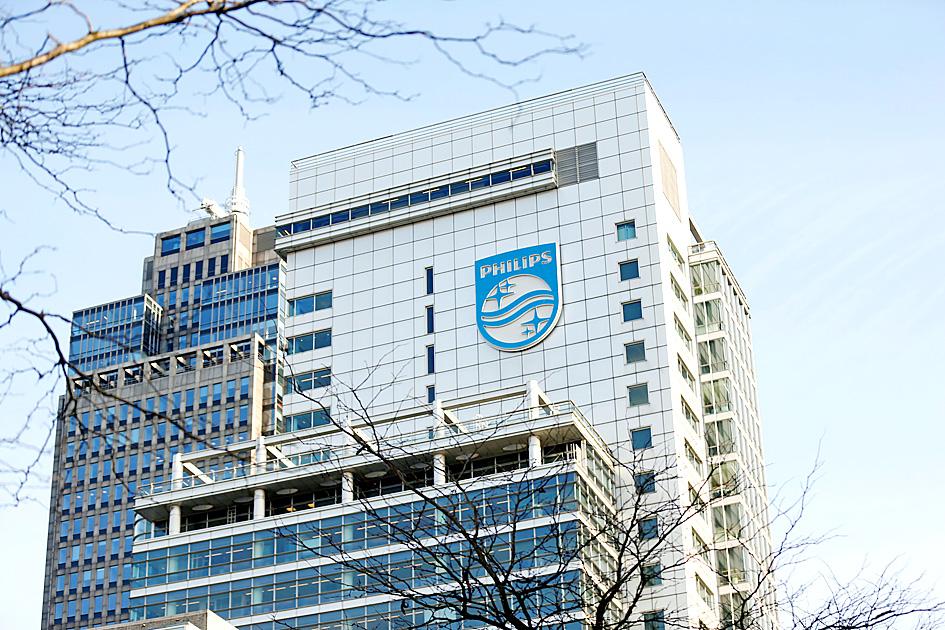Royal Philips NV yesterday said the lingering impact from the COVID-19 pandemic and changes in the way healthcare is delivered would help boost sales of its medical gear for years to come.
The Dutch maker of body scanners and monitors set out a target for average annual sales growth of 5 to 6 percent from next year to 2025, it said.
Growth would be “modest” this year, and in the low single digits next year based on the current solid order book, it added.

Photo: Reuters
During the height of the pandemic, Philips struggled to keep up with orders for its ventilators used to help COVID-19 patients with severe breathing difficulties. Now into the tail-end, Philips expects to benefit from a deep fundamental shift in how patients receive care through remote monitoring and virtual appointments.
“We take a longer view and think we are well positioned for a higher growth even though we have to kind of navigate the short-term disparities in the market,” CEO Frans van Houten said in a Bloomberg interview.
Providing a longer-term outlook, including improved margins, sets Philips apart from a swathe of manufacturers still unable to set mid-term goals.
While the focus remains on acute pandemic care, hospitals are now pushing ahead with surgery and other medical procedures that were put on hold.
Even with increased national debtloads, governments would need to increase spending on healthcare having seen resources stretched, Van Houten said.
Philips reported a 32 percent jump in earnings before interest, taxes and amortization to 769 million euros (US$902 million) in the third quarter. That beat an average estimate of 630.6 million euros.
Philips invested more than 100 million euros on quadrupling ventilator production in just five months.
A US$400 million emergency order from the US backfired when the state unexpectedly canceled the purchase.
Philips booked a 57 million euro provision to cover the lost contract as it seeks to find buyers for the excess stock in Africa.

US SANCTIONS: The Taiwan tech giant has ended all shipments to China-based Sophgo Technologies after one of their chips was discovered in a Huawei phone Taiwan Semiconductor Manufacturing Co (TSMC, 台積電) suspended shipments to China-based chip designer Sophgo Technologies Ltd (算能科技) after a chip it made was found on a Huawei Technologies Co (華為) artificial intelligence (AI) processor, according to two people familiar with the matter. Sophgo had ordered chips from TSMC that matched the one found on Huawei’s Ascend 910B, the people said. Huawei is restricted from buying the technology to protect US national security. Reuters could not determine how the chip ended up on the Huawei product. Sophgo said in a statement on its Web site yesterday that it was in compliance with all laws

SPEED OF LIGHT: US lawmakers urged the commerce department to examine the national security threats from China’s development of silicon photonics technology US President Joe Biden’s administration on Monday said it is finalizing rules that would limit US investments in artificial intelligence (AI) and other technology sectors in China that could threaten US national security. The rules, which were proposed in June by the US Department of the Treasury, were directed by an executive order signed by Biden in August last year covering three key sectors: semiconductors and microelectronics, quantum information technologies and certain AI systems. The rules are to take effect on Jan. 2 next year and would be overseen by the Treasury’s newly created Office of Global Transactions. The Treasury said the “narrow

TECH TITANS: Nvidia briefly overtook Apple again on Friday after becoming the world’s largest company for a short period in June, as Microsoft fell to third place Nvidia Corp dethroned Apple Inc as the world’s most valuable company on Friday following a record-setting rally in the stock, powered by insatiable demand for its specialized artificial intelligence (AI) chips. Nvidia’s stock market value briefly touched US$3.53 trillion, slightly above Apple’s US$3.52 trillion, London Stock Exchange Group data showed. Nvidia ended the day up 0.8 percent, with a market value of US$3.47 trillion, while Apple’s shares rose 0.4 percent, valuing the iPhone maker at US$3.52 trillion. In June, Nvidia briefly became the world’s most valuable company before it was overtaken by Microsoft Corp and Apple. The tech trio’s market capitalizations have been

SPECIALIZIATION: OpenAI is designing a new type of semiconductor with Broadcom that would run artificial intelligence software and respond to user requests OpenAI is working with Broadcom Inc to develop a new artificial intelligence (AI) chip specifically focused on running AI models after they have been trained, according to two sources familiar with the matter. The AI start-up and chipmaker are also consulting with Taiwan Semiconductor Manufacturing Co (TSMC, 台積電), the world’s largest chip contract manufacturer, said the sources, who asked not to be identified because the discussions are private. OpenAI has been planning a custom chip and working on such uses for the technology for about a year, but the discussions are still at an early stage, the sources said. OpenAI declined